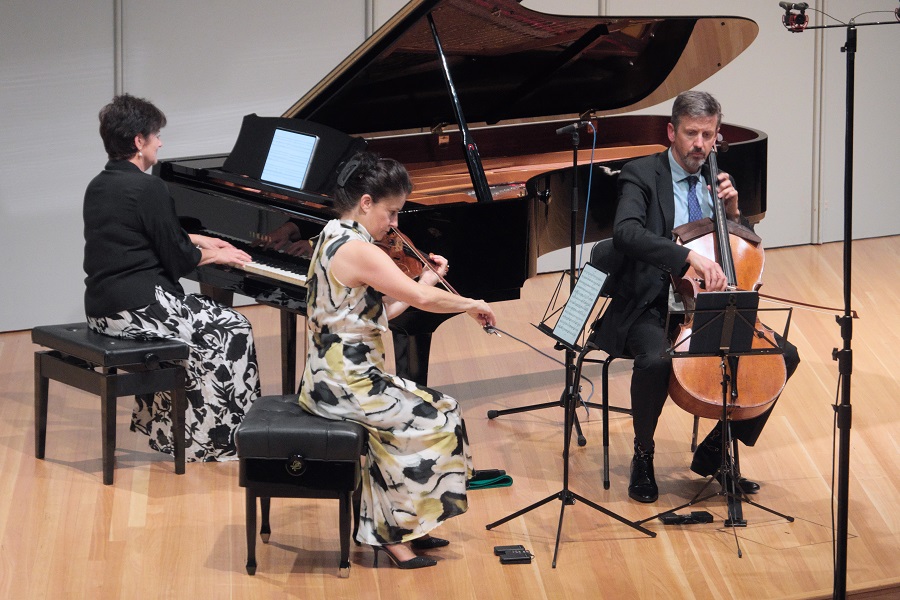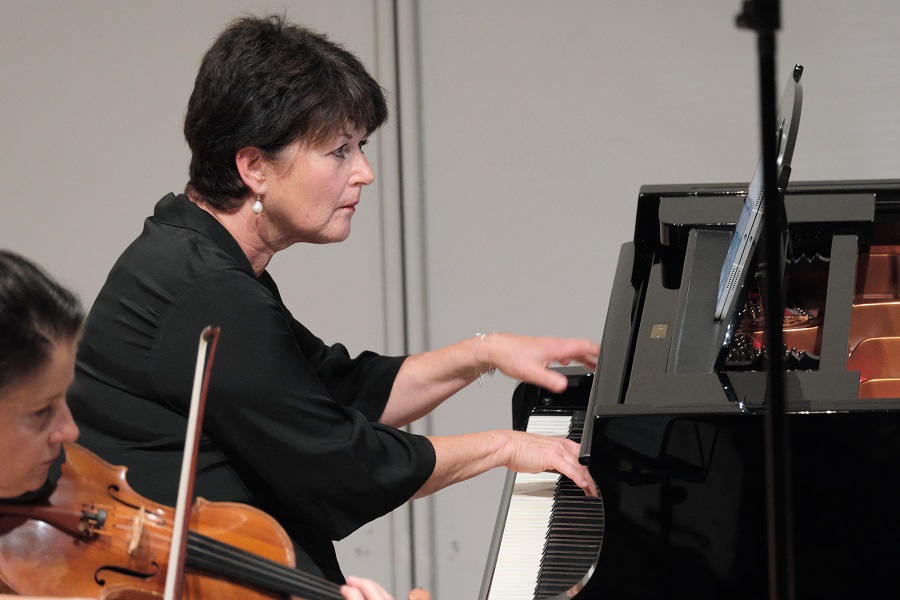
Music / Lonely Angel, Selby & Friends at James Fairfax Theatre, NGA, November 8. Reviewed by MICHAEL WILSON.
There is something about a performance by top-class musicians who’ve played together for decades.
There’s no fuss: no apprehension about what other players might do in the moment. So it was for the final concert of the Selby & Friends season, when Kathryn Selby (piano) was joined by Julian Smiles (cello) and Dimity Hall (violin) for a varied and challenging program of piano trios connecting Germany, France, Spain and Latvia.
In this intimate venue, each musician introduced pieces in their personal styles. Like any good host, Selby made sure her guests shone throughout, even at times where the piano line dominated. Fresh from their farewell tour as one half of the Goldner String Quartet, Hall and Smiles blended seamlessly when that was required, and emphasised discordance when called for, especially in the program’s title work by Latvian composer Pēteris Vasks.
The careers of the other three composers overlap, although their styles and traditions do not. Commencing with Piano Trio No.2 by Spanish composer Joaquín Turina, the strings led off strongly, with plenty of drama and colour. A roller-coaster first movement requires key changes every three bars, themes shared and repeated, passages in unison and in parallel. A restless Spanish dance precedes the triumphal but difficult final movement, played perfectly.

Anything composed by Gabriel Fauré is distinctly Fauré and distinctly French: often daring, unpredictable – yet organised – harmonic treatments, a strong reliance on themes; an essentialist approach which not over-written.
This performance of his Piano Trio in d minor showed off the work’s thoroughly connected structure. It begins dramatically, moving into a gentler call/response pattern between the strings, with the piano providing an unobtrusive foundation.
The piano leads off in the andantino movement, the strings creating ripples beneath, then intervening to drive the tempo forward. The violin and ‘cello are in conversation in the third movement. Then the three instruments take their own individual directions before reconciling for the simple finish.
Brahms was particularly productive in his last six summers visiting Hofstetten, Switzerland. His concentrated Piano Trio No.3, written in 1886, is one highlight. The second movement consists of very fast plucked passages for the strings, which these players carried off with ease, without being showy. The salon-style third movement gives way to the finale, where the tone of the strings merged so well it was hard to tell them apart. Changing time signatures and tempi were navigated beautifully, before the sudden, flourishing conclusion.
Vasks’ Lonely Angel was the program’s highlight. Introduced emotionally by Dimity Hall, the strings mimic the human voice, evoking the spirituality of our planet, anxious for its welfare. Vasks writes, “…this piece is a response to the pain”, where a watching angel is trying to guard the environment from further damage.
Hall spent much of this meditation on the E string, right at the top of the violin’s fingerboard, creating an ethereal, mesmerising atmosphere with cello slides going to the bottom of its range. The piano was the gentle brook beneath, with occasional jolting interventions. Here in particular, Hall, Selby and Smiles made magic.
Who can be trusted?
In a world of spin and confusion, there’s never been a more important time to support independent journalism in Canberra.
If you trust our work online and want to enforce the power of independent voices, I invite you to make a small contribution.
Every dollar of support is invested back into our journalism to help keep citynews.com.au strong and free.
Thank you,
Ian Meikle, editor




![For graphic designer Tracy Hall, street art is like any artwork, her canvas has been swapped out for fences and plywood, her medium changing from watercolours to spray paint.
A Canberra resident for 13 years, Tracy has been a street and mural artist for the past five.
Her first exploration into grand-scale painting was at the Point Hut toilets in Banks five years ago. “They had just finished doing up the playground area for all the little kids and the words [of graffiti] that were coming up weren’t family friendly,” she says.
“So I ended up drawing this design and I got approval for the artwork.”
Many of Tracy’s time-consuming artworks are free, with thousands of her own dollars put into paint.
@traceofcolourdesigns
To read all about Tracy's fabulous street art, visit our website at citynews.com.au or tap the link in our bio! 🎨🖌
#canberranews #citynews #localstories #canberrastories #Citynews #localnews #canberra #incrediblewomen #journalism #canberracitynews #storiesthatmatter #canberralocals #artist #streetart #streetartist #StreetArtMagic](https://scontent.cdninstagram.com/v/t39.30808-6/490887207_1225841146218103_6160376948971514278_n.jpg?stp=dst-jpg_e35_tt6&_nc_cat=106&ccb=1-7&_nc_sid=18de74&_nc_ohc=MUiEmedc4VAQ7kNvwHTUMX_&_nc_oc=Adk-5HjcsfQwB-n_l8zetmr0YqMaupGjrl2gNVCZdsmkxwn-oqjBg_V7pLtGggCE43s&_nc_zt=23&_nc_ht=scontent.cdninstagram.com&edm=ANo9K5cEAAAA&_nc_gid=zUGxMxVeox-VfFZv4iA87g&oh=00_AfFN09hwx4fLSDKDRM6X1bOHHeJViuNl97HnpBuFpR5hfA&oe=680B8C14)



Leave a Reply